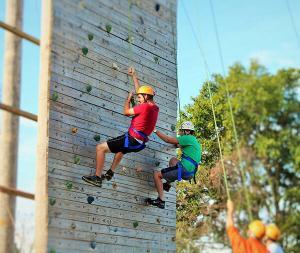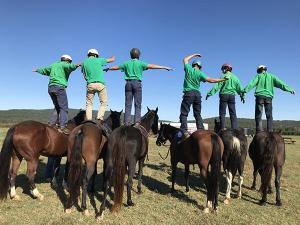Post-Traumatic Stress Disorder in Teens
Does your son struggle with Post-Traumatic Stress Disorder? Learn about how our ranch for troubled youth can help your troubled teen.
Teen Challenge Adventure Ranch understands that parents want to send their children to a safe, monitored environment where their son receives personal care and individual therapies that help heal behavior or mental disorders–whether brought on by trauma, foster care, adoption, addiction, or family genetics.
While your son enrolls in our ranch for troubled youth for counseling, treatment, and improving academic/life skills, Teen Challenge Ranch also helps students struggling with post-traumatic stress disorder improve their mental and physical health.
About Post-Traumatic Stress Disorder in Teens
“Many people will experience traumatic events in their lives, including children and teens. Some researchers estimate that as many as 40% of children and adolescents will experience at least one traumatic event in their lifetime. While most people can “bounce back” from the event after a few days, weeks, or months, others struggle to cope with the experience and the memory of the trauma. These people, including children and teens, can develop what is known as PTSD, or Post-Traumatic Stress Disorder.”
“Traumatic events often include physical violence, an accident, a natural disaster, war, or sexual abuse. Children or teens may have experienced these events themselves, or they may have witnessed them happen to someone else.”
 PTSD Symptoms
PTSD Symptoms
- Avoiding situations that make them recall the traumatic event
- Experiencing nightmares or flashbacks about the trauma
- Playing in a way that repeats or recalls the trauma
- Acting impulsively or aggressively
- Feeling nervous or anxious frequently
- Experiencing emotional numbness
- Having trouble focusing at school
Here are some other examples of PTSD symptoms your son may have experienced:
- Children under six may get upset if their parents are not close by, have trouble sleeping, or act out the trauma in their play.
- Children ages 7 to 11 may also act out the trauma through play, drawings, or stories. Some have nightmares or become more irritable or aggressive. They may also want to avoid school or have trouble with schoolwork or friends.
- Children ages 12 to 18 have symptoms more similar to adults: depression, anxiety, withdrawal, or reckless behavior like substance abuse or running away.
Treating Teens Suffering PTSD
 Here are some common treatment options for teens with Post-Traumatic Stress Disorder.
Here are some common treatment options for teens with Post-Traumatic Stress Disorder.
- Cognitive behavioral therapy – A trauma-focused CBT therapist helps the student identify and correct irrational or illogical thoughts they might have about the trauma itself or people and situations they encounter in everyday life. CBT also typically includes psychoeducation about relaxation and coping techniques for stress.
- Play therapy – This type of therapy can work especially well for younger teens who struggle to communicate their reactions to the trauma and understand what happened. Play therapists use art therapy, games, and other interventions to help your daughter process trauma and cope resiliently with life.
- Eye movement desensitization and reprocessing – EMDR is a technique that incorporates guided eye movement exercises while a child recalls the traumatic event and works through cognitions and emotional responses they have about it.
- Medication – There is no medication that “cures” PTSD, but sometimes antidepressants and anti-anxiety medication can help relieve symptoms in some children and teens while they are also seeing a therapist.
“PTSD symptoms frequently co-occur with other types of mental illness or lead to other issues with children and teens, including substance use, risky behaviors, and self-injury. These issues may also need to be addressed in treatment to protect your child and help them achieve a full recovery.”
Benefits of Our Equine Therapy Program
 The goal of equine therapy for troubled youth at our ranch is to help the boy develop needed skills and attributes, such as accountability, responsibility, self-confidence, problem-solving skills, and self-control.
The goal of equine therapy for troubled youth at our ranch is to help the boy develop needed skills and attributes, such as accountability, responsibility, self-confidence, problem-solving skills, and self-control.
The interaction between the horse and the client often unlocks blocked emotions, allowing them to be processed and healed. Equine therapy also provides an innovative milieu in which the therapist and the patient can identify and address various emotional and behavioral challenges. Both during the activity and after the patient has finished working with the horse, the equine therapist can observe and interact with the client to identify behavior patterns and process thoughts and emotions.
Many of the benefits of equine therapy at our ranch for troubled youth are likely due to the nature of the animals with which the patient and equine therapist interact. Horses are typically non-judgmental, have no preconceived expectations or motives, and are highly effective at mirroring the attitudes and behaviors of the humans with whom they work.
Research shows that Equine-Assisted Activities are an appropriate therapeutic approach for teens. Some conditions or disorders that respond well to EAP or related equine-assisted therapies include:
- Substance Abuse
- Addiction
- Depression
- Anxiety
- PTSD
- Stress
- Trauma
- Eating Disorders
- Behavior Disorders
- Traumatic Brain Injury
- Learning Challenges
- ADD/ADHD
- Learning differences
- Grief/loss
- Bipolar
Our team’s mission is to do all these things to lift up young men and help them to face the world and their peers better equipped with the skills necessary to succeed in life.

Get Help For Your Son Now (888) 289-6818
Sources:




